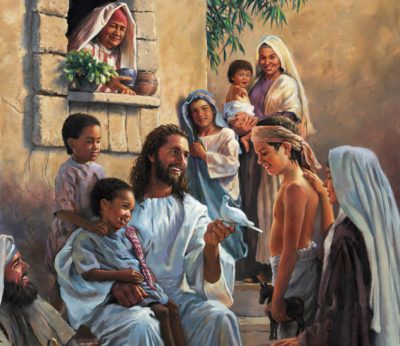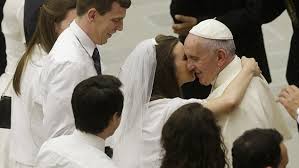
-06-10-2024-
Twenty-Seventh Sunday in Ordinary Time
Gospel text : Mark 10:2-16
 vs.2 Some Pharisees approached Jesus and asked, “Is it against the law for a man to divorce his wife?” They were testing him.
vs.2 Some Pharisees approached Jesus and asked, “Is it against the law for a man to divorce his wife?” They were testing him.
Vs.3 He answered them,
“What did Moses command you?”
vs.4 “Moses allowed us” they said “to draw up a writ of dismissal and so to divorce.”
Vs.5 Then Jesus said to them,
“It was because you were so unteachable that he wrote this commandment for you.
Vs.6 But from the beginning of creation God made them male and female.
Vs.7 This is why a man must leave father and mother
vs.8 and the two become one body. They are no longer two, therefore, but one body.
Vs.9 So then, what God has united, man must not divide.”
Vs.10 Back in the house the disciples questioned him again about this,
vs.11 and he said to them,
“The man who divorces his wife and marries another is guilty of adultery against her.
Vs.12 And if a woman divorces her husband and marries another she is guilty of adultery too.”
Vs.13 People were bringing little children to him, for him to touch them. The disciples turned them away,
vs.14 but when Jesus saw this he was indignant and said to them,
“Let the little children come to me; do not stop them; for it is to such as these that the kingdom of God belongs.
Vs.15 I tell you solemnly, anyone who does not welcome the kingdom of God like a little child will never enter it.
Vs.16 Then he put his arms round them, laid his hands on them and gave them his blessing.
*******************************************
We have four commentators available from whom you may wish to choose
Michel DeVerteuil :Holy Ghost Priest, director of the Centre of Biblical renewal .
Thomas O’Loughlin: Prof of Hist Theology Uni of Nottingham NG7 2RD
Sean Goan:Studied scripture in Rome, Jerusalem and Chicago
Donal Neary SJ: Editor of The Sacred Heart Messenger and National Director of The Apostlship of Prayer.
****************************************
Michel DeVerteuil
Lectio Divina with the Sunday Gospels
www.columba.ie
Textual Comments
Today’s reading follows a previous summary of Jesus’ teaching. It reminds us that this was part of his teaching at this point of his life: “And again crowds gathered round him and again he taught them as his custom was.” All this teaching was very appropriate once he had made up his mind to head for Jerusalem and face the consequences of what he had achieved up to now. This was especially “his custom” at this stage of his mission.
Our text for today is clearly divided into two sections.
Verses 2 to 12 are a teaching on marriage.
Verses 13 to 16 are a teaching on Jesus’ attitude to children.
The juxtaposition reminds us then that Jesus’ teaching on marriage must not remain focused on this aspect of life alone. We must therefore look on his teaching as a wide concept.
This is the glory and the richness of the method of ‘lectio divina‘ and today’s passage is not an exception. In this method, every text of the bible is spoken to the whole world. Every Christian, no matter what his own vocation may be, is set to find within the context of the story before us something they can learn from it. It is always a wonderful message of new life, a way of being truer to what is deep within ourselves.
Jesus shows himself as a wise person. He points out how in the course of every period, a community always tends to take the easy way out. This is a normal turn of events. Then eventually some one like Moses arises on the scene. He makes something official although it was originally just a spontaneous compromise. It was intended to suit a particular circumstance. Now all of a sudden it takes on the force of a law.
 The relationship between man and woman is a very good example. The ancient text of Genesis reminds us that man and woman were intended by God to live on equal terms. There was to be no great difference between them. They are both human beings, created by God to live in harmony. Jesus then is the typical “wise person”. He is able to move beyond the here-and-now problem and see how things were “at the beginning of creation.”
The relationship between man and woman is a very good example. The ancient text of Genesis reminds us that man and woman were intended by God to live on equal terms. There was to be no great difference between them. They are both human beings, created by God to live in harmony. Jesus then is the typical “wise person”. He is able to move beyond the here-and-now problem and see how things were “at the beginning of creation.”
This is why he can see that “they were testing him”. It was not a small question but a great one.
We can read the passage then of other realities which God made to be complementary and we have allowed to become opposed or even in competition. Jesus is the great teacher who restores harmony that was there in the “beginning”. He brings about that what had become two should once more be found as “one body“, always in harmony, never in opposition.
We remember being able to give ourselves to work of different kinds, whatever it may be. The work often seems to be intolerable to us. But we need to be comfortable with ourselves. We must give ourselves as we are – not as we think we should be.
We remember our own country Trinidad and Tobago W.I. for example. Our people have been brought up to be well able to get over the disagreements among themselves and continue to find a harmonious relationship with each other. In this way, our little country can be an outstanding example to many others in the rest of the world. We are called to live in good relationships in spite of our religious disagreements which may appear to be serious but do not prevent us from living in harmony.
We will notice that verses 10 to 12 are separate from the rest of the passage. In fact they don’t occur in the other versions of the story at all.
 They serve as an important addition to the passage. Jesus adds a new element to the usual breakdown between husband and wife. He says,
They serve as an important addition to the passage. Jesus adds a new element to the usual breakdown between husband and wife. He says,
“If a woman divorces her husband, and marries another, she is guilty of adultery too”. This is a remarkable addition telling us that in the Christian Church women have their rights and privileges too. Men have them and so do women. We must insist that this is the right approach to the problem – at every level.
In general we interpret both passages as moments when we find that we come to a deeper insight into a truth. We thought we had it well received. Now we realise that it means more to us than we had originally thought. We accept this with great joy and recognition.
The story of Jesus and the children must not to be limited to one meaning of literal children. In the New Testament, children are always to be taken as examples of the “little ones“. They are those who are not considered important or worthy of serious consideration in our community.
We can apply it to situations where they include people who are called in the bible “tax collectors and sinners”. These are those who are rejected by most people but whom we now recognize as our equals. There are many of them as life teaches us.
We may identify with the disciples, or more probably with Jesus.
His attitude is at three levels.
i) He is welcoming of those whom society has tended to reject as unreasonable.
ii) He shows the children reverence. He “lays hands on them and blesses them”, treating each of them as very important.
iii) He sees that each of them has something unique to teach the rest of us.
All children, and this includes all those in our community we tended to neglect, have a deep lesson to teach us. They tell us how we should relate to those in our community whom we tended to neglect.
Scriptural Reflection
“Try to approach the future as a friend, Without a wardrobe of excuses…W.H. Auden
Lord, there are many things in life which you have made complementary, not two but together forming one reality:
*young and old in a community;
* men and women in relationships;
* materially rich people and those who are not;
* people of different cultures in our one world;
* body and soul within each of us.
* the born and the unborn
It is difficult to make this unity, and so we allow ourselves to divorce these things from each other.
We see them as opposed and even in competition.
We thank you for people like Jesus who teach us that it was not so at the beginning of creation,
and what you have united we human beings have no right to divide.
Lord, we who have been happily married thank you today for the great gift by which two people whom you have made male and female left their mothers and fathers and the two then became one body,
so that we are no longer two but just one body
in a bond so strong that no one could ever break it.
Lord, we pray that your Church may remain faithful to the teaching of Jesus, so that even though we come back and question one another over and over again, we may continue to say, as he did, that not only is the man who divorces his wife and marries another guilty of adultery against her,
but also the woman who divorces her husband and marries another is guilty of adultery too.
Lord, we remember the time when little children were not allowed to go to Holy Communion. We thank you that you sent us a great pope like Pius X. (1835-1914) He was rightly indignant that they were being turned away; he allowed them to come to Jesus and would not let them be stopped any longer.
“The incarnation is the mystery in which each of the thousand of millions of human beings living on our planet has become a sharer from the moment he is conceived beneath the heart of his mother.” …. Pope John Paul II
Lord, when we become professionals, doctors, lawyers, consultants, bankers, principals of schools, politicians we tend to isolate ourselves in our air-conditioned offices with efficient receptionists who turn away people when they bring small problems to us.
lawyers, consultants, bankers, principals of schools, politicians we tend to isolate ourselves in our air-conditioned offices with efficient receptionists who turn away people when they bring small problems to us.
We pray that we may feel indignation at this and that in our presbyteries and church offices we may rather put our arms round the little people,
lay our hands on them and share our blessings with them.
“To understand Scripture we must stop acting like mere spectators.” …Karl Barth
Lord, sometimes at our church services little children distract us;
they make noise, run up and down the aisle and make comments.
We block them from our minds so that we can concentrate on our prayers or on the sermon.
But they are teaching us a precious lesson, that if we do not feel at home with them we can never enter into your presence.
“How much better it is to carry relief to the poor than send it.”… John Wesley
Lord, when we were young we said foolish things, or expressed ourselves awkwardly, and most adults dismissed us. Today we remember with gratitude that one person who welcomed us as Jesus welcomed little children, and took us seriously, showing us that what we were saying was in fact very important, and so gave us a blessing.
*************************************
Thomas O’Loughlin
Liturgical Resources for the Year of Matthew
www.columba.ie
Introduction to the Celebration
 We gather each week to form the church: the community who follow Jesus as the way to the Father, and who encounter Jesus, and become one with him, when we gather about his table. It is this encounter with Jesus that makes this a sacred place and a sacred event.
We gather each week to form the church: the community who follow Jesus as the way to the Father, and who encounter Jesus, and become one with him, when we gather about his table. It is this encounter with Jesus that makes this a sacred place and a sacred event.
At our gathering today we are reminded in the gospel that one of the other sacred places where we can encounter the Son of God is in marriage: the union, indeed, of a married couple is the image of the bond that exists between Jesus Christ and us, his church.
General Notes
1. Preaching on divorce
There is a perceptible shudder in most congregations when this gospel on divorce is read: the subconscious expectation is that now ‘we are in for it’ – an harangue on the evils of divorce, why it is bad for society, and why it must be opposed at every turn. There is a popular folk memory of such ‘pulpit thumping‘ that is far larger than probably the real extent of such preaching in the past, and despite the fact that few people under sixty can even remember seeing a sermon delivered from an actual pulpit. So the first thing to remember today is that there is a lot of deep-felt resentment about such harangues in any community, and it creates a tension and dissonance between people and their hearing of the good news. It is part of the task of every preacher of the good news to seek to remove that tension.
However, quite apart from the fact that harangues on a topic like divorce simply do not work (indeed, they are counter-productive in that people resent them), there is a deeper reason why they are wholly inappropriate at a celebration of the Eucharist.
Imagine a situation where a preacher was on a soapbox in a public place (it could be a blog on the internet or a column in a local newspaper or a social media podcast) and is arguing the church’s stand on divorce. Here the communications dynamic is that the preacher is explaining the church’s position to all-and-sundry, some, many, or perhaps all are outsiders to the church and the gospel, and who may be inquirers about our position or who may be detractors of Christianity and for whom this message is an explanation.
However, the situation at the Eucharist is completely different: we are meeting as the church, our gathering makes us the church, and as an intimate family meal of sisters and brothers in Christ, we cannot hear the church’s teaching as if we were outsiders to that teaching – alas much actual preaching fails to recognise this!
The communications dynamic at the Eucharist is that we are a group made into a sacred unity as the body of Christ, and we hear this message as intimates. So we hear the gospel as good news about ourselves and our chosen way for the pilgrimage of faith and life. Any preaching which starts off on the premise that the Eucharistic congregation needs to be told what ‘they should know about the church’s position‘ on this or that (which silently assumes that the gathering and ‘the church‘ are distinct realities), is based on a false ecclesiology and ignores the nature of the task the liturgy entrusts to the homilist.

Pope Francis on one of his papal walkabouts issued a powerful call for the church to embrace Catholics who have divorced and remarried.
What practical steps, therefore, can the president of an assembly take to allay the fears of many that they are going to be harangued?
• First, concentrate on marriage as part of God’s loving plan of salvation, rather than starting from the failure of marriage at the point when divorce looms on the horizon.
• Second, since marriage is part of human experience, recognise that a’ celibate‘ speaking on marriage sounds as convincing as someone offering to service your car because he has bought the manual although he has never worked in a garage! Preaching on marriage by a celibate has as much integrity as an plutocrat preaching on the option for the poor: the lack of integrity stems from the fact that there is not the combination of thinking, experiencing and feeling that is the hallmark of true human knowledge/wisdom.
• Third, get someone to give the homily who can help the community reflect on marriage from within their own Christian experience. Obviously, if there is a married deacon, this is a day when he should preach. Otherwise, begin the homily by inviting someone, or a couple, to address the gathering, and conclude by having a moment to reflect on what they have shared with their brothers and sisters. Every community has someone with some theological training or who has some experience with one of the many groups that act to support Christians in the marriages.
• Fourth, there will be people in the assembly for whom ‘regular‘ marriage is not an option, or for whom marriage has failed. So whoever addresses the community needs to be reminded that presenting some ‘ideal‘ marriage as covering all and as being assured of success if only some criteria are met is not only false witness, but can be deeply hurtful. No one should leave the Lord’s banquet of love feeling hurt — this is a basic Christian principle.
• Lastly, watch out in using the word ‘sacrament‘: most people think of an event (e.g. a baptism ceremony) or a thing (e.g. the Blessed Sacrament) rather than of an on-going mystery when they hear the word. So ‘the sacrament of matrimony‘ is the wedding. It is a waste of time to try to correct this: our task is to communicate the good news, not to make sure that people are aware of the correct use of theological jargon.
2. The shorter version of the gospel
There are two reasons for opting for the shorter form of the gospel today.
First, the two topics are really distinct and reading both just creates confusion.
Second, we live with the on-going effects of the recent and historic abuse of women, children and vulnerable people by clergy/church institutions. Reading this longer text, unless you are prepared to openly talk about the wickedness of these crimes — some of whom may be well known to everyone in the assembly seems like obfuscation and denial. If that is the message that is sent out, then the good news has not been preached.
3. The reader of the first reading
The passage from Genesis Chapter 2 is one that many women object to, note in it that the author believes women should be subordinate to men (see the commentary). This in itself creates difficulties in the liturgy, but these are only exacerbated if this lection is read by a man to the women in the assembly. So this is an occasion where one should try to ensure that the reader for this reading is a woman.
Homily notes
1. It is a basic principle of communication that one should not start with a negative: is there anything more off-putting than someone approaching you and you already know they are only going to tell you about problems? Likewise, with today’s gospel: the question was put to Jesus about divorce, yet it is an understanding of marriage that is the real issue. But that raised another issue: given that their marriages are the most complex area of the lives of most of the community gathered, what can be said that is not trite in the course of five to seven minutes?
2. If you are not going to appeal to your own experience of marriage as a place where the risen Christ is encountered — i.e. a sacramental place —then it is perhaps best to offer some texts for the community to reflect upon such that the homily becomes a guided meditation.
 3. Introduce the meditation with some phrase like this: This passage from Mark’s preaching reminds us that marriage is part of God’s loving plan for the creation, and people who are married can, in their marriages, encounter Jesus who renews the creation, brings healing from discord, and who gives us strength to be people of love. Here are some passages to reflect on which express in prayer how we view marriage.
3. Introduce the meditation with some phrase like this: This passage from Mark’s preaching reminds us that marriage is part of God’s loving plan for the creation, and people who are married can, in their marriages, encounter Jesus who renews the creation, brings healing from discord, and who gives us strength to be people of love. Here are some passages to reflect on which express in prayer how we view marriage.
4. Use these texts from the prefaces of marriage:
‘You [O God] are the loving Father of the world of nature;
you are the loving Father of the new creation of grace.
In Christian marriage you bring together the two orders of creation: nature’s gift of children enriches the world and
your grace enriches also your church.’
‘You created man [and woman] in love to share your divine life.
We see [our] high destiny in the love of husband and wife,
– which bears the imprint of your own divine love. 
Love is [our] origin,
Love is [our] constant calling,
Love is [our] fulfilment in heaven.
The love of man and woman is made holy in the sacrament of marriage
And becomes the mirror of your everlasting love.’
These two texts (from Prefaces 72 and 74 respectively) should be enough, if read slowly with pauses, to create a space of reflection.
5. Some may object that offering a poetic reflection is ‘dodging‘ a sermon, but this fails to grasp the fact that what is called for is a homily –a communication event that allows the assembly to come into contact with the Word of God (something alive and active, and not to be confused with the words in the gospel’s text) in response to hearing the preaching of the evangelists.
In a noisy, busy world – a world that is so frenetic that it is well to remember that in every gathering there will be one person who has forgotten to turn off their mobile, and many others who are worried that they are missing calls while their mobiles are ‘off‘ – deliberately creating spaces for reflection may be a necessary precondition of people hearing the Word.
**********************************
Sean Goan
Let the reader understand
www.columba.ie
Gospel
The gospels agree that Jesus, unlike his contemporaries in the Pharisee movement, takes a very strong line on divorce. He argues from God’s plan in Genesis (see first reading) that the original intention for marriage was that it should be a covenant of love willed by God and that it should not be set aside by any human agency. This answer no doubt shocked his disciples who would have, like their contemporaries, taken divorce for granted.
 However, when questioned, Jesus drives the point home forcefully by speaking of adultery and divorce in the same breath and then also of women divorcing. This was not allowed among the Jews but did occur among the Gentiles.
However, when questioned, Jesus drives the point home forcefully by speaking of adultery and divorce in the same breath and then also of women divorcing. This was not allowed among the Jews but did occur among the Gentiles.
So Jesus is calling for a radical rethink on the nature of married love, one that rejects the dominant view based on a husband’s power over his wife and instead emphasises the relationship of equals intended by God. This challenging teaching is followed by another exhortation on the appropriate way to receive the kingdom. It is worth remembering that it is not so long since Jesus advised his disciples that anyone who welcomes a child welcomes him. Now we find them preventing the children from coming to him and not surprisingly he is angry with them. This is not just because of the incident but because of their repeated failure to really listen to what he is telling them.
Reflection
The message from the Bible in relation to the sexes is that this relationship is not built on superiority but on complementarily. It is a message that with the passage of time an d the rise of patriarchal societies has become blurred. Genesis insists that both are equally made in the image and likeness of God (Gen 1:26-27) and share fully in the destiny which is theirs as children of God.
d the rise of patriarchal societies has become blurred. Genesis insists that both are equally made in the image and likeness of God (Gen 1:26-27) and share fully in the destiny which is theirs as children of God.
Unfortunately Jesus does not offer specific pastoral advice for people who find themselves in broken marriages but we do know that we are always called to be compassionate as our heavenly Father is compassionate.
*****************************************
Donal Neary SJ
Gospel Reflections for Sundays of Year B
www.messenger.ie/bookshop.
Reaching Out to Family
The followers of Christ can be caught between valuing the commitment of life’s promises in marriage, and compassion for people whose marriages have broken up. Jesus values the commitment too: adultery is condemned as a sin against justice – of tampering in some way with the commitment made of one person to another.
Why is this followed by a comment about children that they should come to him? Obviously from love for children, and also for love of the child inside each of us, the child of God that we all are. So for the child of God who is suffering through the breakdown of commitment, Jesus is saying to come to him, be welcomed into his arms and be blessed.
While trying to value commitment in marriage and also in religious life, he is also reaching out to people who are in difficult, personal situations. We follow him in this, letting go of judgements about people’s relationships. We never know people unless we have walked in their shoes and at their pace.
The church has tried in many ways to reach out to people who need care, protection and healing in Pope Francis’ Letter on the Family, The Joy of Love.
In situations where there are differences in people’s attitudes, especially in the family, it is good to keep doors of communication open. This is the way towards greater love and healing, and allowing Jesus be part of every aspect of life. Many parents have been happy in later years that they kept lines of communication open with children whose lifestyles may have been different from theirs.
Think of a family relationship for which you are grateful.
Lord, may your love be upon us, especially in our commitments.
***********************